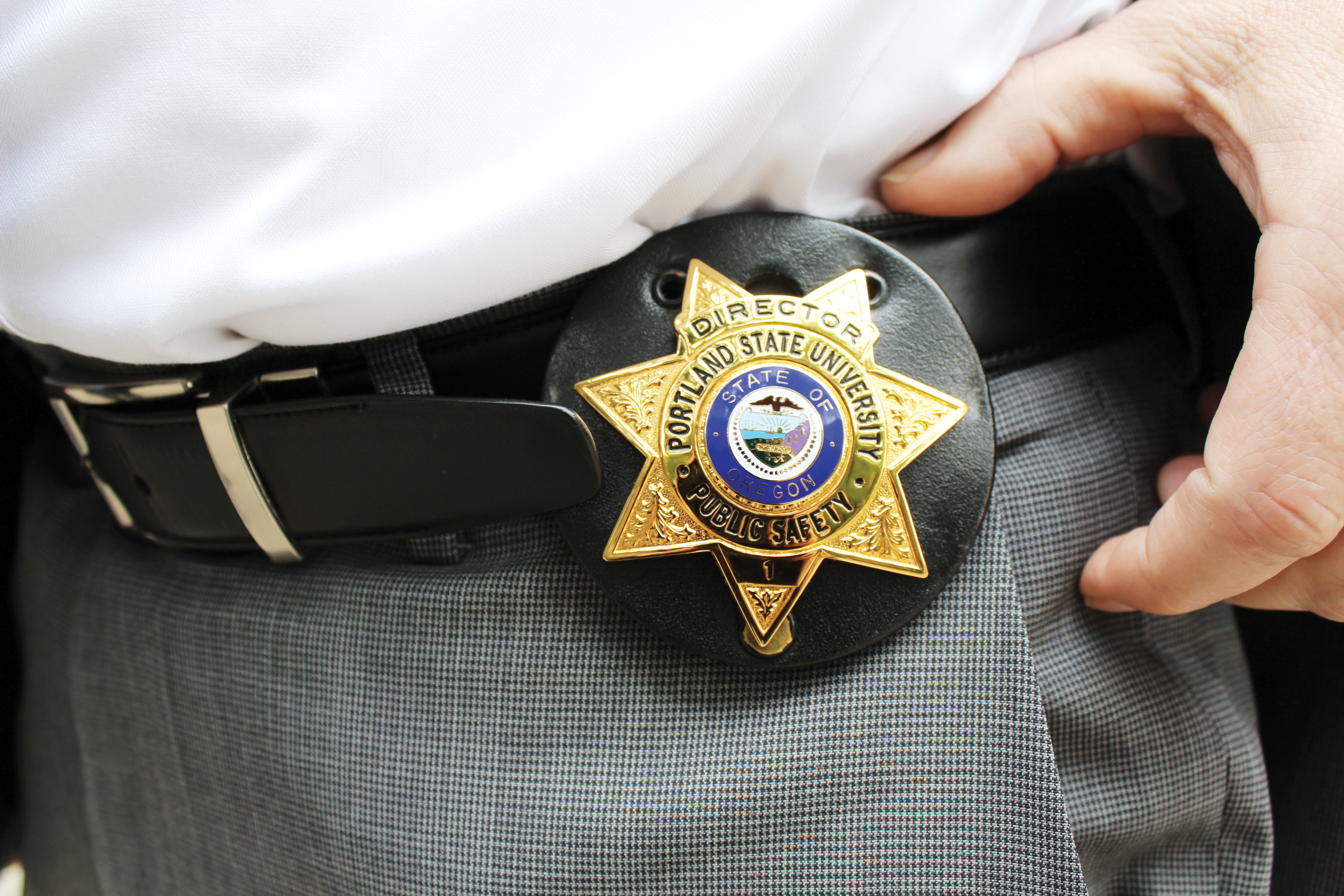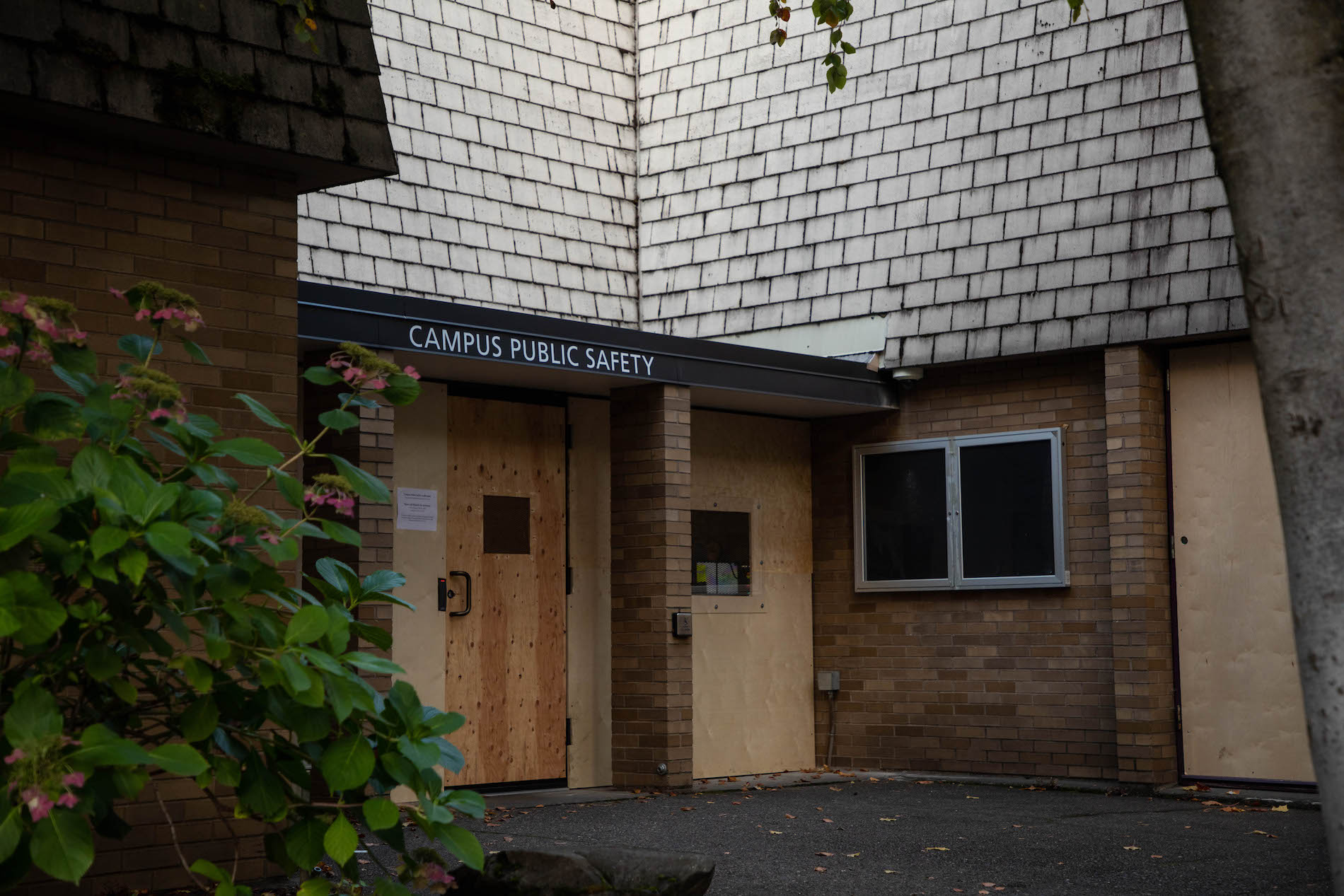The road to introducing police officers on campus has been long and complicated.
In 2008, former Vice President for Finance and Administration Monica Rimai formed a committee to address the needs of campus safety at PSU. Possible solutions included upgrading the status of campus law enforcement to a police force.
In April 2013, PSU President Wim Wiewel outlined plans for a Task Force on Campus Public Safety, led by Vice President Jackie Balzer.
Wiewel commented on the need to explore campus safety options. “An issue has developed concerning whether or not PSU’s Campus Public Safety Office should become a fully sworn police department, to better deter and respond to crime,” he said.
The Task Force included university administrators, faculty, and students, and released its final report in November 2013, recommending PSU “explore ways to ensure access to sworn officers who are appropriately trained in campus policing and available on-site to the PSU campus community.”
Broad scope & national perspective
A 2015 report from the Bureau of Justice Statistics shows that PSU’s transition is on par with other universities. The BJS surveyed campus law enforcement agencies across the country during the 2011–2012 academic year, focusing on four-year colleges and universities enrolling 2,500 or more students.
The surveys revealed that nearly 75 percent of campuses employed armed officers, while 92 percent of campuses used sworn police officers. 94 percent of sworn campus police officers were authorized to carry a sidearm, while nearly 90 percent had arrest and patrol jurisdictions that extended past the borders of the campus.
Of the participating schools, 94 percent also arm their officers with pepper spray, 93 percent with batons, and 40 percent carry conducted energy devices. These numbers are significantly lower at schools that hire private security guards.
The report also shows an increase in the percentage of campuses employing sworn police officers. Between the 2004–5 and 2011–2012 academic years, the percentage of campuses increased from 75 to 77. The percentage of armed officers rose from 68 to 75.
At a student media press conference in March, President Wiewel said,
“[T]he Department of Justice came out with a report where they tallied what other universities do in this regard,” Wiewel said. “I found out that there are 256 public universities with more than 10,000 students, and only 4 percent of those do not have a sworn police force. That’s 10 universities.”
“And of the 100 largest universities—public and private—that’s universities with 25,000 students, so we’re in the 100 largest—it’s also only 4 [universities] that don’t have sworn police forces.
“The four are [PSU], NYU and Columbia in New York, which both have a huge [NYPD] presence, and DePaul in Chicago, and they use a huge Chicago police presence as well. We are an extreme outlier.
“I know a lot of people didn’t like it, and I didn’t like the idea until about a year and a half or so ago, either,” he continued. “But it made me feel even more—we don’t like this, but it’s the right thing to do. The [alternative] is irresponsible.”
Board of Trustees addresses Campus Safety
When the PSU Board of Trustees first convened in September of 2014, it announced plans to investigate the hiring of sworn police officers. University representatives met with students and organizations across campus and hosted a public forum on campus safety to collect input from students, staff and faculty.
In December 2014, The Board of Trustees voted 11–2 to approve the resolution to turn CPSO into a bifurcated entity with both campus public safety officers and fully-fledged police officers.
While the administration has publicly called for student involvement throughout the process, some students feel their voices have not been heard.
Members of the PSU Student Union—a non-hierarchal union of students that does not receive funding from the university—said they’ve encountered more student opposition to armed officers than is reflected by the administration.
Olivia Pace, a sophomore at PSU involved with PSUSU, criticized the efficacy of the administration’s outreach to students and cited a lack of transparency throughout the process.
“[I] heard about this from students who were scared way before I ever heard from anywhere in the administration,” Pace said. “In fact, I don’t think I ever would have heard a single thing from the administration if I had not joined PSUSU, and if I had not been to [BOT] meetings and heard about it.”
PSUSU members and other students have been vocal about their opposition to armed officers on campus. They’ve created petitions, formed alliances, distributed educational materials, hosted rallies, protests and organizational meetings.
Members have attended BOT meetings and forums and held scheduled meetings with administrators. They staged a “die-in” at the December 11 BOT meeting where trustees ultimately approved the plan to create a sworn police force.
Implementation Advisory Committee
After the BOT approval to implement a sworn police force, an Implementation Advisory Committee formed to research and draft plans and policy for this transformation the PSU’s Campus Safety Office. The IAC included 16 members, representing areas such as PSU resource centers, AAUP, SEIU, various university department faculty, professors and three students from ASPSU.
A major outcome of the IAC’s work is the recommended establishment of the Campus Public Safety Oversight Committee, which is designed to serve as a body that maintains and ensures student and community involvement, while holding CPSO accountable to the people and campus it serves.
Ukiah Hawkins, an ASPSU representative on the IAC, served as a member of the IAC’s oversight topic team. In an interview with the Vanguard on May, he described the intended function of the CPS Oversight Committee.
“The oversight committee will be a self-perpetuating body that will hopefully last ad infinitum, Hawkins said. “As long as there are students on campus who need to have a place to have their voice represented, the oversight committee will exist.”
Hawkins emphasized the need for an outlet for student voices on campus safety.
“Through the actions of [the IAC] and the future actions of the oversight committee we really want to ensure students have a voice in their safety and security,” he continued.
“I feel like we did the best we could with the resources we had available,” Hawkins said. “I feel like the product we have is definitely going to benefit the student body if they want to be involved.”
Other key topics in the recommendations include training tactics, conflict resolution, community involvement, policy and more.
In June 2015, the IAC presented its report and recommendations to the Board of Trustees special committee on Campus Public Safety. On June 11, The full Board of Trustees voted in favor of implementation in a 9–3 vote.
One of the first public actions from 2015-16 ASPSU President and Vice President Dana Ghazi and David Martinez after they were elected in May was to ask the BOT to delay the vote on implementation recommendations. The Board opted to move forward with its approval.
Ghazi and Martinez oppose the arming of campus officers, and have expressed a desire to explore alternatives. They released a statement in response to the vote.
“[W]hile we always knew it would be a difficult case to make in such a short timeframe, we feel strongly that it was an effort worth taking in light of the many concerns we heard from students,” they said.
The chief’s perspective
Phillip Zerzan, chief of CPSO at PSU, said his priority is to provide law enforcement services to the campus community.
“And that means treating people that are in need with compassion and care,” Zerzan said. “Helping students that are in crisis get the assistance that they need, all they way up to having the ability to interrupt a shooter that’s inflicting death or serious physical injury, in an effective and timely manner.”
Community trust is imperative when providing these broad services, according to Zerzan.
He also said ensuring an effective response in times of possible life-danger is just as crucial.
Zerzan encourages those who do not feel safer with armed officers policing the PSU campus to initiate dialogue with him.
“That narrative is not consistent with the folks we have on campus and the vision that the entire university community has on what they want campus law enforcement to look like, and [those with concerns] certainly had the opportunity to [add] input,” Zerzan said.
Although PSUSU and CPSO disagree on whether police need guns on campus, Zerzan said they still share a common goal.
“I think we agree that everybody wants to provide police services to the campus that are responsive to the campus, under the control of the campus, and reflect our values,” Zerzan said.
Zerzan continues to meet with PSUSU. He said this is the third generation of PSUSU that he’s actively engaged in conversation.
“For some people, it might seem like there’s not this engagement,” Zerzan said. “And, like I told them, I don’t really like the difficult conversations, but I need and want to have them.”
Perspective from officers
After retiring from the Portland Police Bureau, where he had served for 25 years, Sergeant Joseph Schilling came to PSU. Schilling was in part motivated by the opportunity to help move the organization to a police agency.
“Unless there’s a new city, you don’t have a new police agency,” Schilling said. “And more often than not, new cities usually are incorporated into larger agencies that are there, so it’s a unique opportunity to develop a new agency. And that was the biggest part of the draw that brought me here.”
Schilling became a sworn police officer on July 1, along with three other officers. He said his day-to-day job hasn’t changed.
“We’re better equipped to handle the same things that we handled before,” Schilling said. “And by equipped I don’t mean a gun. I mean better equipped in the training and experience and the authority.”
Officers are called upon in the same manner as before the deputization, according to Schilling.
“Our scope of authority in what we’re responsible for, as far as the physical authority on campus, hasn’t increased,” Schilling said. “We’re not going out and branching outside the district of the university doing police work. We’re just here for the university.”
A notable difference is that CPSO’s police officers are now authorized to carry firearms. Regardless of the general focus on firearms, Schilling said that’s not what police work is about.
“It’s about the training and the richness of the experience and interaction with other police officers that increases the community policing aspect; that increases the safety of the college and the campus and the students,” Schilling said.
“That’s what it’s really about,” he continued. “The firearm is just another tool, or a Taser, or a nightstick, or pepper spray, or conflict resolution and de-escalation techniques. Those are all tools that are the big picture of doing police work.”
Schilling said he is more at ease knowing officers have a force option when interacting with criminals on campus. He said the safety of officers and the community are both important.
Officers can respond easier and faster to a theoretical school shooter or deadly force situation, instead of waiting for the Portland Police Bureau to arrive, Schilling said.
Peter Ward, originally from the U.K., served as a police officer in Tigard and Portland before becoming a campus safety officer at PSU in October 2012. He is now a sworn PSU police officer.
He said the majority of his work is community engagement.
“This is a real opportunity…for a new styling of policing; a neighborhood policing,” Ward said.
Officers at PSU are not seen separate from the community, according to Ward.
People are not their occupations, he said.
“When I am Peter, it just happens to be a police officer,” Ward said. “The majority of these people build a personal relationship with everybody in the campus university district, which is what I do. I’m here to build personal relationships with people.”
Ward recognizes the concerns about arming campus officers, but he said not all officers are going out of their way to use lethal force.
“Not all use of lethal force is under discussion, and I am aware that there are recent events where [it] has been,” Ward said. “The only thing I would say is treat me as an individual.”
“Now, if I give you cause to believe that I am overstepping my authorities as a police officer, fine,” he continued. “But if I don’t give you cause, is it not unfair to paint me as somebody who is going to use that kind of unlawful, and in those cases where it has been unlawful, [violent] or lethal force? Just because somebody else has done it?”
#DisarmPSU
In June, PSUSU hosted a “Demilitarization meeting” on campus, which led to the development of #DisarmPSU, a movement connected to but distinct from PSUSU.
“[W]e know that guns don’t cure violence. Statistically, it doesn’t decrease the chances of being hurt in a school shooting setting,” Pace said. “It actually increases our chances of experiencing undeserved violence from police officers.”
“Our goal is to…remove their weapons and create what we feel is a proper and innovative way of running campus and keeping our campus safe,” she continued. “And we feel that students should make decisions about our safety. And we don’t feel safe in the way that we’re being protected.”
They’ve proposed alternative approaches, such as funneling the funds it takes to introduce a sworn police force–$1.5 million over three years–toward resources for students who may be at risk of being targeted or adversely affected by this new Public Safety model.
Members of the #DisarmPSU movement hosted a rally in the Park Blocks and interrupted President Wiewel during the incoming freshmen convocation on September 21. They held signs that read “Police State University” and “Disarm PSU.”
Pace said the group has received a divided response to the interruption. They have not received a direct response to the incident from President Wiewel, though they’ve had interactions with other administrators that Pace described as horrible.
Many students responded with gratitude, while others said they felt targeted and disrespected as a result of #DisarmPSU’s actions.
Scout Zabel, another member of PSUSU, said students who felt disrespected by the interruption may not know the history of implementation or PSUSU’s involvement.
“A lot of them don’t realize that we have been working within the system for a very long time to not make this happen,” Zabel said. “We’ve been filling out the surveys. We’ve been speaking at public comment…But all the information they have is the administration telling them they tried to outreach—which in some way they did. But they didn’t use the information they collected, which was overwhelmingly that students didn’t want this.”
Since the interruption of the convocation, PSUSU’s membership has grown significantly.
“Our meetings are generally like 7-8 people, just core organizers,” Pace said. “And both meetings–we’ve had 2 PSUSU meetings since the convocation and one #DisarmPSU meeting–both those meetings were 40 plus people. Which is absolutely huge.”
Pace and Zabel both expressed faith in students ability to overturn the university’s decision, especially given the current social climate in the United States.
[It’s] a good time for us to have more voice in pushing back,” Zabel said. “In the wake of the Black Lives Matter movement there’s more of an awareness of the reality of policing and what policing does. I think that might work to our advantage.”
PSUSU member Will Peterson said it may become more difficult to meet the group’s goals as the implementation process moves forward and CPSO brings in more sworn officers.
“If it’s going to happen…this is the time,” Peterson said. “The next year is the time for it to happen before it progresses into something we cannot actually do something about.”
PSUSU has plans to strategize resources to help student populations they believe have the potential be targeted by police officers on campus–those experiencing houselessness, as well as students dealing with chemical dependencies or mental health issues.
“I think we as students have the capacity to create resources for the students who’ve been criminalized in this process,” Pace said. “I think if they were to be disarmed it would realistic for us to just kind of start over and figure out what needs to be done for the students.”
The process continues
The implementation of PSU’s new campus safety structure will take three years. The university currently employs four active sworn police officers, in addition to its unarmed public safety officers. Some officers are currently in training to become sworn and deputized.
The full manifestation of the new public safety policy will result in 12 armed officers, 10 unarmed security officers and one police detective.
The university is accepting applications for members of its first Special Oversight Committee for Campus Public Safety until October 30.*
Applications can be found on PSU’s Finance and Administration website.
Watch the video the Vanguard’s ridealong with two of PSU’s current safety officers
*Note: The print version of this article listed the application deadline as October 15, when the correct deadline is October 30.






